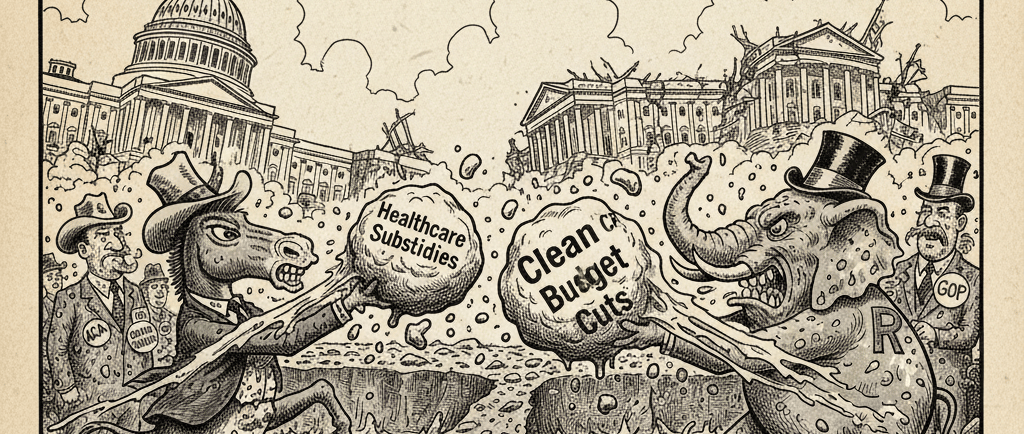The Budget Battle : The US Government Shutdown
#Mudslingers
James Murphy
10/12/20253 min read


🎙️ The Budget Battle: Following the Dollar from Potholes to Policy
Welcome back! Last week, we showed how local community tech like the Loqiva Hub can force accountability from your town manager up to the Mayor’s office. Today, we're taking that principle of accountability and looking at its ultimate breakdown: the U.S. Federal Government Shutdown.
You can't follow the dollar from Potholes to Policy if the whole system is frozen. For nearly two weeks now, the federal government has been shut down. This isn't a glitch; it's the stark result of a budget battle where the stakes are life-or-death—or, at the very least, health insurance.
Why the Federal Government is Closed: Healthcare vs. Continuing Resolution
The core of any government shutdown is the failure of Congress to pass the necessary appropriations bills (or a temporary measure called a Continuing Resolution, or CR) to fund government operations by the start of the fiscal year (October 1st).
This shutdown, which began on October 1, 2025, isn't about general spending levels—it's centered on a singular, massive policy demand: healthcare subsidies.
The Stick in the Wheel: Expiring ACA Subsidies
The primary roadblock is the Affordable Care Act (ACA) Premium Tax Credits.
The Problem: Enhanced subsidies that help millions of Americans afford their health insurance on the ACA exchanges are set to expire at the end of the year. If they lapse, costs for roughly 20 million people will skyrocket.
The Democratic Demand: Democrats, led by Senate Minority Leader Chuck Schumer, are refusing to pass a "clean" Continuing Resolution (a simple, flat-funding extension) unless it is paired with an extension of these critical ACA tax credits.
The Republican Counter: Republicans, who control both chambers of Congress, are demanding that the government be reopened first with a simple CR. They insist on negotiating the healthcare issue later, but they have resisted permanently extending the subsidies, which they view as a key component of a massive healthcare law they have long sought to repeal.
In short, one side says: No funding without health cost protection. The other side says: Reopen the government, then we'll talk about health policy. The result is the current deadlock.
The Immediate Impact: A Failure of Service
When Congress fails to act as the professional public servants they are, the ripple effect is immediate, painful, and far-reaching.
1. The Human Cost 📉
Furloughed Workers: Approximately 750,000 "non-essential" federal employees have been furloughed (told to stay home without pay).
Working Without Pay: Hundreds of thousands more, including TSA agents, air traffic controllers, and many military personnel, are classified as "essential" and are required to work without a paycheck.
Economic Strain: These workers and their families are already facing extreme financial uncertainty, with the first wave of missed paychecks hitting this week. While federal law ensures they'll get back pay eventually, federal contractors are not guaranteed the same.
2. The Services That Stop 🛑
A shutdown is not just a holiday for bureaucrats; it is a cessation of service to the public.
National Parks & Museums: Smithsonian museums, the National Zoo, and numerous National Parks have closed, cutting off public access and tourism revenue.
IRS and Assistance: IRS tax help lines are closed, delaying assistance for taxpayers.
Health and Safety: While critical functions like Social Security checks continue, processes like the processing of new grant applications at the National Institutes of Health (NIH) and certain public health surveillance programs have been curtailed.
Flight Delays: Reports indicate a sharp increase in flight delays due to staffing shortages at air traffic control centers and airports.
3. The Accountability Vacuum 🎤
In the battle over the budget, the goal isn't service; it's leverage.
Political Pawns: Citizens, and particularly the hundreds of thousands of federal workers and those relying on the ACA, are being used as political pawns in a high-stakes legislative negotiation.
No Data, No Debate: Unlike the transparent, quantifiable data provided by a Digital Town Hub on local issues, the federal budget debate is opaque, emotional, and driven by party-line votes, completely disconnecting the service failure from the elected officials responsible.
The Humorous, Yet Powerful, Power of YOU (Again)
If a local hub gives you the data to demand accountability from your city, the shutdown gives you the proof of incompetence at the national level.
This crisis proves the need for officials who will act as professional public servants, not political strategists. The next time you're asked to vote for your representatives, remember: they chose to shut down the government rather than pass a funding resolution to keep it running.
It is up to US to remember that. It's time to swap your soapbox for a spreadsheet—and now, maybe, a ballot. Go find that sign-up sheet, log into your city’s digital hub, and start governing.
#P3PC
#ImpactInvesting
#ESGSolutions
#ConsciousCity
#FutureofWork
#PPPs
That's is...for now.
Connect
Partnering for a better Municipalities everywhere.
#IMPACT
#SmartCommunity
© 2025. All rights reserved.
